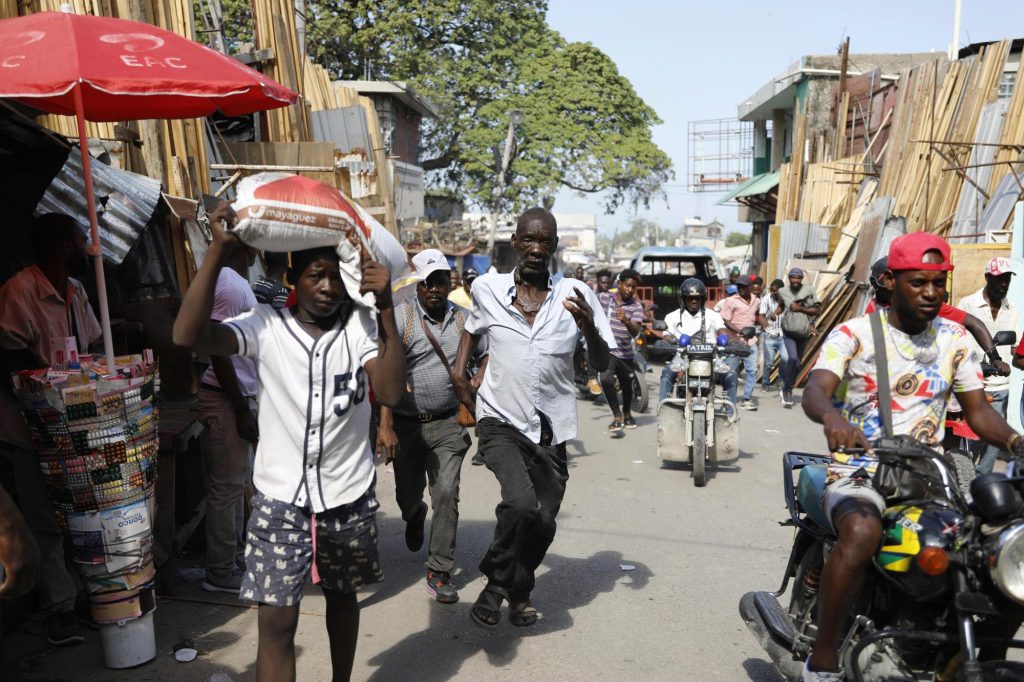By DÁNICA COTO (Associated Press)
SAN JUAN, Puerto Rico (AP) — Many foreigners, including numerous individuals from the United States and Canada, are marooned in Haiti, urgently attempting to depart the tumultuous country where anti-government gangs are clashing with police and have already closed both of the country’s international airports.
They had traveled to Haiti for various reasons such as adoptions, missionary and humanitarian work, but are now confined in hotels and residences, unable to exit via air, sea, or land due to the chaos and the gangs’ demand for Prime Minister Ariel Henry's resignation.
“We are seriously trapped,” said Richard Phillips, a 65-year-old from Ottawa, Canada, who has visited Haiti more than thirty times for projects with the United Nations, USAID, and a Haitian nonprofit named Papyrus.
Upon arrival in Haiti in late February, Phillips flew to the southern coastal city of Les Cayes to teach farmers and others about operating and repairing tractors, cultivators, planters, and other machinery in a region known for its production of corn, rice, peas, and beans.
Upon completing his work, Phillips traveled to the capital, Port-au-Prince, only to find that his flight had been canceled. He stayed at a nearby hotel, but due to continuous gunfire, moved to a safer area.
“We are actually quite concerned about where this is going,” he expressed to The Associated Press via phone. “If the police force collapses, there’s going to be anarchy in the streets, and we might be here a month or more.”
Numerous individuals have lost their lives in the gang assaults that began on Feb. 29, and over 15,000 people have been left homeless due to the violence.
Earlier this week, Haiti’s government prolonged a state of emergency and imposed a nightly curfew in an attempt to quell the violence, but the attacks persist.
Gangs have set police stations on fire, freed over 4,000 inmates from Haiti’s two largest prisons, and attacked Port-au-Prince’s primary airport, which remains inactive. Consequently, the prime minister has been unable to return home after a trip to Kenya to advocate for the U.N.-supported deployment of a police force from the East African country.
Phillips indicated that he has explored all possibilities for leaving Haiti by air. A helicopter operator could not obtain insurance for such a flight, and a private plane pilot stated that the approach would be too risky. As for attempting to travel to the neighboring Dominican Republic: “We could potentially cover miles and miles to reach a border, but I'm certain that's also perilous.”
Despite being stranded, Phillips mentioned that he remains composed.
“I’ve been shot at many times in Haiti and have bullet holes in my truck,” he recounted. “Personally, I’m kind of used to it. But I’m sure other people, it’s quite traumatic for them.”
Yvonne Trimble, who has resided in Haiti for over 40 years, is among the U.S. expatriates unable to depart.
She and her husband are in the northern coastal city of Cap-Haitien, waiting for a private evacuation flight for missionaries that had already been canceled once.
She said over the phone that they are completely restricted. She stated that it's the worst she has ever seen, with complete disorder.
Trimble mentioned how a large crowd gathered at the airport in Cap-Haitien recently and started throwing rocks and bottles after hearing a rumor that the prime minister was about to land.
She and her husband have a flight scheduled for next week through Florida-based Missionary Flights International.
Roger Sands, the company’s vice president of administration, mentioned that up to 40 people have called Missionary Flights International hoping to leave or be put on standby.
He said they are receiving constant phone calls. The main concern is that whenever people see an airplane, they assume the prime minister is returning, and there is a large part of the society that doesn't want that to happen, so they do not want to be the first ones in.
It's unknown when Haiti’s two international airports will reopen.
Sands mentioned that it's hard for them. They do not like seeing their planes on the ground when they are needed.
A couple working as missionaries, who preferred to remain anonymous due to safety concerns, stated that they have been living in Haiti for several years but cannot leave because they are in the middle of adopting a 6-year-old boy.
The woman said they have no choice but to stay as they consider themselves a family.
While her husband was supposed to travel to the U.S. last week for medical treatment due to Type 1 diabetes and related complications, he has had to put the four appointments he had made on hold.
Currently, the four appointments he made are on hold.
He expressed some frustration.
Matt Prichard, a 35-year-old from Lebanon, Ohio, and his family are also unable to leave. He is the COO of a missionary and has two children with his Haitian wife, as well as an 18-year-old son.
The rest of his family has not been able to obtain the necessary documents to enter the U.S. yet, so they will all remain in southern Haiti for now.
He said they unfortunately seem to be stuck.
Prichard mentioned that his son is stressed by the situation, telling him that he should leave because 'this isn't a good place for you. Just get out of here.'
But Prichard stated, “As a father, you can’t leave your kids or your family.”
He mentioned that the local grocery store has almost run out of basic goods and gas has been difficult to find.
He said that the expat community in Haiti is really their comfort. The connections and relationships are what are helping them get through.









